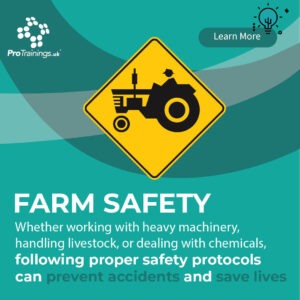Keeping Safe on a Farm: Essential Tips for Farm Safety
Farming is one of the most rewarding professions, but it comes with significant risks. Ensuring farm safety is crucial to protect yourself, your family, and your workers. Whether working with heavy machinery, handling livestock, or dealing with chemicals, following proper safety protocols can prevent accidents and save lives. In this post, we will explore essential tips for staying safe on a farm, all in accordance with UK regulations.
Understanding the Risks
Farms are dynamic environments with a wide range of potential hazards. The Health and Safety Executive (HSE) identifies agriculture as one of the most dangerous industries in the UK. The key risks include:
- Machinery Accidents: Tractors, harvesters, and other machinery pose a high risk of injury. Regular maintenance and proper training are essential.
- Livestock Handling: Large animals can be unpredictable, and improper handling can lead to serious injuries.
- Chemical Exposure: Pesticides and fertilisers, if not handled correctly, can cause severe health problems.
- Falls: Working at height, especially on ladders or in silos, increases the risk of falls.
- Confined Spaces: Areas such as grain silos or slurry pits can be extremely dangerous due to limited oxygen or the presence of toxic gases.
Essential Farm Safety Tips
To minimise these risks, it’s important to adhere to the following safety measures:
1. Regular Training and Refreshers
Please make sure that everyone working on the farm receives proper training in using machinery, handling livestock, and working safely at heights. Regular refresher courses can help keep safety practices top of mind. Consider taking a catastrophic bleeding course which can be taken using our video online training or we can come to you and train all your staff, as when an accident on a farm happens, it is often serious. Also upgrade your first aid kit to a serious bleeding kit. They are no expensive and can save a life if someone has a catastrophic bleed and they can be self administered.
2. Machinery Maintenance
Regular maintenance of farm machinery is a good practice and a legal requirement under the Provision and Use of Work Equipment Regulations (PUWER). Always check machinery before use, and ensure that safety guards are in place.
3. Proper Handling of Livestock
When working with animals, always use appropriate equipment and be aware of their behaviour. Keeping livestock calm and controlled reduces the risk of injury.
4. Safe Use of Chemicals
Store chemicals securely and ensure that they are labelled correctly. Use personal protective equipment (PPE) when handling chemicals, and follow the Control of Substances Hazardous to Health (COSHH) regulations.
5. Working at Height
When working at height, always use proper equipment such as harnesses and ensure that ladders are secure. The Work at Height Regulations 2005 provide specific guidelines to reduce the risk of falls.
6. Awareness of Confined Spaces
Confined spaces should only be entered by trained personnel with the correct equipment. Always follow the Confined Spaces Regulations 1997 to prevent accidents in these hazardous areas.
Emergency Preparedness
Despite taking all necessary precautions, accidents can still happen. Ensure that first aid kits are readily available and that all workers know the location of emergency equipment. Additionally, having a clear emergency plan in place, which includes contact details for emergency services and a strategy for evacuation, can be life-saving.
Legal Obligations
As a farm owner or manager, you are legally obliged to ensure the safety of everyone on your farm. This includes conducting regular risk assessments, providing training, and ensuring that all safety measures are up to date. Non-compliance with safety regulations can lead to serious legal consequences, including fines or prosecution.
Conclusion
Farm safety is not just about following regulations; it’s about creating a culture of awareness and responsibility. By understanding the risks and implementing proper safety measures, you can create a safer working environment for everyone on your farm. Remember, safety is everyone’s responsibility, and taking the time to educate and prepare can make all the difference. Take health & safety training courses.
Learn more about any aspect of farm safety and stay compliant and ready incase the worse happens, see our courses page and for first aid equipment, visit our first aid store.
